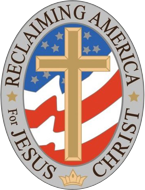
However, there is one major difference between these two churches. Though both pastors are eloquent and preach wonderful sermons, the pastor in the first church carefully avoids addressing controversial political issues like abortion, homosexuality, gambling and same-sex “marriage,” and would never dare mention a political candidate by name or identify where that candidate stood on such issues.
The pastor of the other church believes that God would have him speak out about the moral issues that affect his congregants and their families. Unlike the pastor at the first church, this pastor has boldly proclaimed that public schools should not mandate evolution, an infant child before birth has a right to life, and only marriages between one man and one woman should be recognized. He has strongly condemned sodomy, gay-rights and civil unions, and has even identified where politicians running for public office stand on such issues.
For his actions, the pastor of the second church has been sued by the Internal Revenue Service, which seeks to revoke his 501(c)3 tax-exempt status. The pastor now faces a serious dilemma: Either compromise his own convictions and stop talking about these controversial political issues and where candidates stand on such matters, or do what he believes God has called him to do.
Like the pastor of the second church, you, too, face a real problem. You might agree with the preacher that God’s chosen servants should follow the example of the prophet Nathan who confronted King David with his sins of adultery and murder. However, the IRS regulations adopted during the term of Lyndon Johnson in 1954 provide that which hold tax-exempt status under § 501(c)3 of the Internal Revenue Code
may not “participate in or intervene in … any political campaign on behalf of any candidate for public office” and may not use any “substantial part” of their activities to “influence legislation.” And in struggling economic times, you might be concerned that your financial contribution to the church will not be tax-deductible should you choose to join the second church. While the proposed hypothetical example may seem far-fetched or extreme, that very situation actually exists in churches across America.
Many pastors are now realizing the serious deterioration of our morality and its dire consequences to our culture. They resent the unfair restrictions by the government on what they say, and they believe that IRS efforts to silence the church on the moral issues of our day constitute an unlawful command not to address the whole counsel of God (Acts 20:27). Attempts by the IRS to withdraw tax-exempt status is seen as an effort to relegate the church of Jesus Christ to social and cultural irrelevance.
On Sunday, Sept. 28, 2008, 33 pastors of churches representing various denominations across our country decided to challenge the IRS. From the pulpit these pastors endorsed a particular candidate for president in the November election. They did so because of their belief that the opposing candidate’s position on abortion and other moral issues is contrary to God’s Word, and that it is their duty to preach the whole truth. Their organized effort is a direct affront to the IRS and a challenge to those IRS regulations that unlawfully restrict churches from addressing a candidate’s position on moral issues. They understand that prior to 1954 there was never a restriction on what pastors could say from the pulpit. However, repeated attempts by members of Congress to revoke these IRS regulations have failed, leaving no other option for pastors who view such regulations as a violation of historic church jurisdiction.
Some defend the outrageous policy of the IRS by arguing that tax-exemption for churches is a privilege and not a right. But in reality, tax-exemption for churches is a recognition of an exclusive jurisdiction belonging to the church. I am constantly amazed that the most strident advocates of separation of church and state cannot grasp this simple concept and instead insist that the state has the power to tax a church. As Chief Justice John Marshall stated in 1819 in McCulloch v. Maryland, “The power to tax is the power to destroy.” Certainly, the concept of separation of church and state, properly understood, was never intended to mean that that the state could destroy the church.
Our forefathers came to America seeking religious freedom from state control over their churches and what pastors preached from the pulpit. Those who drafted the First Amendment to our Constitution intended “to prohibit an establishment of religion such as the English church presented, or anything like it,” according to the United States Senate
in 1853. When the state begins to dictate what pastors may or may not say from the pulpit, an establishment of religion exists by giving favored treatment to those churches that remain silent about moral issues of the day.
We must be constantly vigilant against attempts by the state to control the church. Lord Acton, a renowned British historian and political philosopher in the 1800s, commenting on Jesus’ answer to the Pharisees about paying taxes to Caesar (Matthew 22:21), declared that, “To limit the power of the state ceased to be the hope of patient, ineffectual philosophers and became the perpetual charge of a universal Church.”
These brave pastors challenging the IRS are not only doing what they believe, they are doing their duty to fulfill their God-ordained role as conscience and critic of the state. May God bless their effort.

Recent Comments